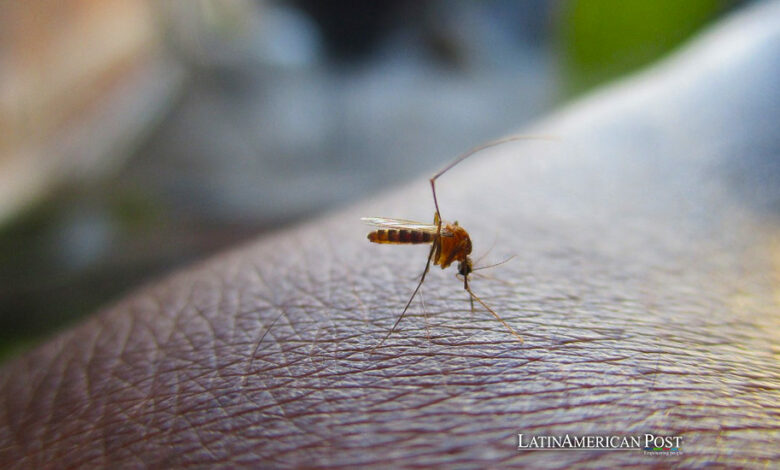Argentina Battles Rising Tide of Dengue Fever Deaths

As dengue fever claims 197 lives in Argentina, the nation confronts a surge in cases, raising alarms and prompting a rigorous public health response amid a declining epidemic curve.
Amid Argentina’s bustling streets and tranquil pampas, a silent battle is being waged against an insidious foe: dengue fever. The latest official figures released this Sunday have painted a concerning picture: the death toll has climbed to 197, with 36 new fatalities reported in the last week alone.
Argentina Grapples with Dengue Outbreak
During the current season, which spans from week 31 of 2023 to week 14 of 2024, there have been 269,678 recorded cases of dengue fever — a staggering increase of 36,682 from the previous week. Of these, 643 cases have been deemed severe. The nation, known for its rich cultural tapestry and passionate tango, is now grappling with an outbreak that has extended to 23 of its 24 jurisdictions, signaling a widespread viral presence.
However, not all news is dire. According to Argentina’s Ministry of Health, the dengue epidemic curve shows signs of retreat. In the penultimate week analyzed, weekly case numbers decreased significantly by 32% compared to earlier reports. This marks a notable downturn from mid-December when the country experienced a relentless upswing in positive cases that persisted well into the year.
This decline could signal the effectiveness of Argentina’s aggressive public health measures or the natural ebb and flow of epidemics. Yet, the descent in numbers is cautious optimism amidst a health crisis that remains a potent threat to the country’s well-being.
Demographic Vulnerability and Mortality
The distribution of deaths by gender is nearly even, with females accounting for 53% of fatalities and males for 47%. The average age of those who have succumbed to the disease is 49, underscoring the vulnerability across age demographics. Alarmingly, the highest mortality rates are among older people over 80, followed by those in the 70-79, 60-69, and 30-39 age brackets. Notably, the most significant number of cases occurs in adults between 30 and 39 years old.
Argentina’s battle is a stark reminder of Latin America’s broader challenges, where dengue is endemic in many countries. The region’s fight against dengue fever is exacerbated by climate change, urbanization, and the proliferation of the Aedes aegypti mosquito, the disease’s primary vector. Countries like Brazil, Colombia, and Honduras have faced similar struggles, contending with the public health burdens and economic costs of outbreaks.
Multifaceted Approach to Combat Dengue
The challenge is multifaceted. Public health campaigns focus on mosquito control efforts, including fumigation and eliminating stagnant water where mosquitoes breed. There’s also an emphasis on community engagement, with citizens urged to take preventive measures to protect themselves and their families. However, these efforts are up against the relentless spread of the mosquito and the four distinct dengue virus serotypes, which complicate the development of immunity and vaccines.
The story of Argentina’s dengue fever outbreak is not just about statistics; it’s about individuals and communities. It’s about the mother in Buenos Aires who now diligently checks her patio for standing water, the farmer in Santa Fe who has lost a neighbor to the disease, and the health workers in Tucumán who are on the front lines of this fight, laboring day and night to treat the afflicted and educate the public.
As Argentina confronts this public health menace, the government’s role has become ever more critical. Strategies that balance mosquito control with public education, healthcare readiness, and research on dengue fever are imperative. Moreover, as the country faces this epidemic, it stands not alone but as part of a larger Latin American community that shares in its struggles and learnings.
The drop in weekly case numbers brings hope but also brings a question: Is this a temporary reprieve or a sustainable trend? The answer lies in the ongoing efforts of health officials, researchers, and everyday Argentinians, who are the actual foot soldiers in this battle against dengue.
Also read: Milei Positions Future U.S. Base in Argentina as Strategy to Reclaim Falklands
In this complex narrative, where public health, environmental challenges, and human lives intersect, the path forward for Argentina—and indeed for all of Latin America—requires resilience, innovation, and collective action. The continent is no stranger to facing formidable challenges, and the fight against dengue fever is yet another testament to its indomitable spirit.
Government’s Role and Collective Action
As Argentina presses on in its campaign against dengue, there are lessons to be learned for other nations grappling with similar issues. Cross-border collaboration on research, sharing of best practices, and mutual aid can amplify the impact of each country’s efforts. After all, diseases know no borders, and neither should the endeavors to overcome them.
The story unfolding in Argentina is more than a health crisis; it is a narrative of adaptation, strength, and human tenacity. It speaks to the broader Latin American context, where the will to forge ahead remains unwavering despite the adversity brought on by pandemics and endemic diseases.
As the nation watches the epidemic curve with bated breath, the hope is that this decline is the harbinger of an eventual end to the outbreak. But beyond hope, there is action, and in the actions of the Argentine people and their government, there lies the possibility of turning the tide on dengue fever, ensuring that this season’s decline becomes a lasting legacy of health and vitality.




